R. Michael Phillips's Blog, page 3
August 3, 2013
Passage Of Crime, book trailer
Heritable traits are passed from one generation to the next and then combine with acquired traits. The wrong combination of those traits can be deadly. PASSAGE OF CRIME, the next generation of murder in the Ernie Bisquets Mystery Series.
Click here to read more about the new mystery.R. Michael Phillips
Author: Along Came A Fifer
www.eastlondonadventurersclub.com
Passage Of Crime
July 14, 2013
Passage Of Crime
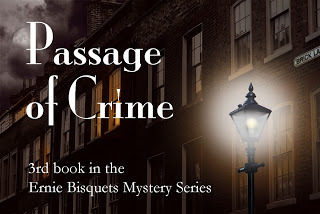
Coming soon!
Passage Of Crime
I'm excited because the release is not too far off now.
About the book:
The most unpredictable character trait can be buried deep in the dark soul of the next generation. But be advised—Evil will eventually seek its own level, and then evolve. PASSAGE OF CRIME, a new twist on murder in the Ernie Bisquets Mystery Series.
London’s East End, once known for poor boroughs and a derelict rail yard, is enjoying an optimistic resurgence. It’s becoming an affordable option for middleclass residents looking to have their pounds go further. Despite this sweeping out of old rubbish, a cautious step is still advised when passing by a few remaining dark alleys. If only Mary Walsh had listened.
Prophet Brown, a disfigured, pathetic little man, called Detective Inspector Flannel after stumbling upon the body of a young woman in one such alley. Flannel quickly realizes she is not the random victim she appears. Add to that, the crime scene is hauntingly reminiscent of an old unsolved case; a case that almost ended an otherwise brilliant career eight years ago.
For the moment, Prophet Brown is the only solid link between the two cases. He has been in the employ of Lord Alfred Raventhorn, a charismatic and well-connected Member of Parliament for 17 years. Raventhorn is also the very man Flannel unsuccessfully accused of the murders in the previous case. It should be noted here, in the private conversations of those of impeccable character and devoid of a tendency toward exaggeration, remarks have been made regarding the MP's rumored ill treatment of Prophet.
Flannel finds himself navigating a very treacherous course. His superiors have warned him for the last time to tread cautiously around the MP, as the rising tide of the past threatens to pull him under. Reluctantly, Inspector Flannel turns to a most unlikely ally, a reformed pickpocket named Ernie Bisquets. Together they disentangle a mesh of old lies and current clues attempting to bring a ruthless murderer to justice–ignoring the dangerous notion of murder being a carefully disguised trait passed from one generation to the next.
PASSAGE OF CRIME is a traditional English mystery, complete at 75,500 words. Sure to appeal to Nancy Atherton and Bill Crider fans, Passage Of Crime brings together the unlikely combination of a dowdy old Scotland Yard Inspector and a plucky reformed pickpocket in this whodunit set in contemporary London.
Email me if you would like to be contacted when the book is released.
R. Michael Phillips
Author: Along Came A Fifer
www.eastlondonadventurersclub.com
February 10, 2013
Writer's Block
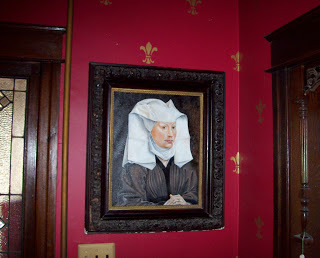
Writer’s Block
Anytime I get stuck on a plot line or character introduction I like to turn back to my brushes and a blank canvas. There is a great deal to be said about diverting creative energy in order to get the flow going in the right direction again.Fortunately I started out life as an artist. It’s something I still enjoy, and has afforded me a fine living. Having that to turn to in times of writing stagnation is a comfort. It jumpstarts the creative juices and helps me work through whatever has stymied me.About a month ago, while writing a short story about a reluctant murderer, I found myself in a quandary about just how to commit the crime. I wanted it to be different, but relatable in about 12,000 words. Getting the story started wasn't a problem. Then, about three chapters in, I found myself pacing the studio without a clue on how to bring about the demise of a very evil antagonist. The deed had to be worthy of the crimes committed, yet done in a manner acceptable to the reluctant protagonist. Hence, my dilemma.It wasn’t long before I was sketching out a painting. I decided on a copy of a 15thCentury Flemish painting; Portrait Of A Young Woman, by Rogier van der Weyden. It has always been one of my favorites, and I had just acquired a frame worthy of such a work. Normally I would paint something original, but painting a copy of an Old Master allows me to think through the writing issue rather than concentrate on what I’m painting. It sounds odd, but it actually works for me. And if I’m going to paint a copy, it might as well be one I like.Together, we worked through my issues with the story. I made notes for the next chapters as the Young Woman kept a watchful eye on what I was doing on the canvas. As a result, I can safely say my creative juices are flowing once more over the treacherous rapids of murder. The painting is finished and hanging in my living room—the final result you see pictured above—and I’m back at my keyboard getting ready to deliver evil his just reward.In another post I’ll let you know how the story turned out.R. Michael Phillips
Author: Along Came A Fifer
www.eastlondonadventurersclub.com
January 5, 2013
A Few Words About Flash Fiction
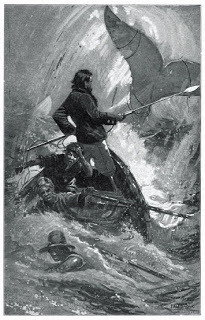
Flash Fiction is more or less a derivative of the short story. Through the years many great authors have said so much with so few words. O. Henry’s Gift of the Magi comes to mind, as does the work of Poe and Maupassant. Aesop’s Fables are another fine example. Flash Fiction takes this one step further.Consider Flash Fiction is to an author what the 100 Yard Dash is to a Marathoner; or, for the fitness crowd, Pilates for the brain. To sharpen the point even more, it’s the telling of a complete story in the least amount of words–usually 500 or less. The important thing here is you tell the whole story . Taking an excerpt from a longer story does not constitute flash fiction. Despite what others might think, that would still be considered an excerpt.Hemingway is credited with penning the most celebrated with this 6 word story: “For sale: baby shoes, never worn.” Tucked into those few words are all the elements of a good story. There’s a protagonist, conflict and a resolution. The remarkable thing about this type of fiction is the brevity of the work allows the reader to extract all that is implied, leaving them to interpret and draw their own conclusion of the author’s intent. So, next time you have the seed of an idea and a little time to kill, put your story down on paper. When finished, start distilling it down to the least amount of words. Remember, implication is your friend, and brevity your motivation.
For example:
Call me Ishmael. I find myself alone, bobbing in the blood-stained waves, hoping the masts in the distance are that of the Rachel and not the delusions of a man half crazy with thirst and the visions of the great white whale that has brought about this end. The once turbulent waves are calm, devoid of any trace of the mysterious captain and his obsession with finding and killing the whale responsible for the loss of his leg. Gone, too, is the Pequod, an ominous looking ship festooned with the bones and teeth of the very devils its captain sought with murderous intent. If I’m to die, so be it. All that’s left of this nightmarish voyage is the unused coffin I cling to–the coffin of Queequeg, a fellow harpooner. His repulsive appearance hastened my opinion of him as a savage, though our brief time together proved me wrong. Now, even in death, his kind spirit and selflessness will most likely save me from the tragic end I’ve witnessed to this brave crew.
It's a shame Melville didn’t have a blog.R. Michael Phillips
Author: Along Came A Fifer
www.eastlondonadventurersclub.com
December 30, 2012
A Few Words About Rejection

So you got rejected. As a writer you should understand this is all part of the process. It’s not like this is something new. We have experience rejection since we were old enough to draw on a wall with a crayon. We saw it as art, but mom saw it as a reason to hide the crayons. It doesn’t mean it wasn’t art. We put pen to paper (or actually fingers to keyboards) with the idea of one day standing beside those literary giants that inspired us to do more with our thoughts and imaginations than just daydream. We toil over a keyboard for what seems like an eternity. Editing, then editing again. Reading, editing, moving this, adding that, until we are certain we hold within our hands exactly what the world has been waiting for–the novel all future novels will be compared to.With the query written, and the first chapter attached, the email shoots off into hyperspace in search of a worthy agent for such a masterful work of fiction. You start the next book, certain your offer of representation is being drafted simultaneously. Maybe just one more cup of coffee as you await the email alert indicating your invitation to success has arrived.Then it happens. You open the email and, with little more than a polite salutation, your heart is ripped from your breast. It’s a short paragraph, and the only word that stands out is – ...unfortunately. No need to read on. That same feeling comes over you. The painful vision of mom collecting up the crayons and carrying them off to another room flashes through your mind. You weren’t old enough to understand then, but you should now. Even though mom took the crayons away, you didn’t stop finding ways to express yourself or finding an audience for that expression. You continued on despite the rejections you faced. For those who didn’t give up, the roots of those scribblings blossomed into true artistic expression. Remember, as with every artistic expression, it’s not suited for everybody. Patience and a belief in what you’ve produced should keep you to task. I read somewhere 90% of writers don’t become published authors because they quit after the first sense of rejection. If you look at this from a glass half-empty/half-full perspective, what really happened is 90% of your competition has been eliminated. You can certainly compete with the other 10%. With the New Year upon us, it’s time for a new resolution. You felt strongly enough about putting those fingers to the keyboard, now keep at it until your query lands in front of the right person at the right time. Do your research, continue to develop your writing skills, and get the next idea on paper and out the door. There is an agent out there waiting for you’re your submission, don’t disappoint them. A very bright and Happy New Year to all the soon to be authors out there!R. Michael Phillips
Author: Along Came A Fifer
www.eastlondonadventurersclub.com
August 25, 2012
Creating a Book Cover

www.eastlondonadventurersclub.com
R. Michael Phillips
Author: Along Came A Fifer
www.eastlondonadventurersclub.com
July 8, 2012
The Turbulent Seas of Submission

As misfortune would have it my original independent publisher, for unavoidable circumstances, has closed their doors. Thus, I find myself adrift once more, navigating the turbulent seas of submission. Fortunately, I've grown much wiser over these past four years, and have continued to refine my skills as a writer. So the idea of securing representation for my next book through a literary agent is not as daunting as it once was. To be perfectly honest, it was something I fully intended to do once I established the series and felt confident in my abilities as a writer. I look at this unfortunate event now as an opportunity to pursue that course.
The first two books in The Ernie Bisquets Mystery Series have met with wonderful reviews and acceptance, so I was not about to let this event strip the wind from my sails. With my rights returned, and so many new tools available to authors, I quickly republished both books through CreateSpace. I was apprehensive at first, but in the long run this was something I felt I needed to do. The books have an established presence in the literary world that I worked hard to create. As I move forward with the series I'll need to leverage this presence. With both of those books back on course, I turned my attention to the new book and the task of querying literary agents.
I find I'm much more thoughtful in those I query. No more scattershot into the wind. I did extensive research into the agencies to see what similar authors/books they represent and how my work might compliment their list of clients. I have a far greater understanding of how valuable an agent's time is, so if I expect to be considered I need to be considerate first. I compiled my list through QueryTracker.net– what an exceptional tool for any writer. After refining my search, and making copious notes on the agents highlighted in the results, I narrowed the list to whom I felt might find my work worth considering.
This is where it gets scary again. My list of agents is finite. There is no adding to it a few weeks later in my journey. I have one shot to capture their attention. Every word from here forward must be carefully considered and arranged in a one page query to arouse within the agent the same excitement I carry within me about the characters and story I've created. To some extent, this single page query is more difficult to write than the entire 300 page manuscript. It's also the cause of many sleepless nights.
More about the query phase in my next post.
R. Michael Phillips
Author: Along Came A Fifer
www.eastlondonadventurersclub.com
March 1, 2012
Oranges and Lemons - part 4
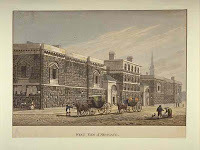
"By now you know the man in that trunk was not me, it was my half-brother. It was the day before you were to arrive. He came for his share from the sale of the company. He came with a cleaver–a threat to any refusal to his claim on the money. He was mad. He went on rambling about how I ruined his life. I thought he was going to kill me."
The purging of his soul was taking a toll on Mr. Caldwell. His breaths became short, shallow wheezes. Despite the struggle needed to continue, he did so, slowly and with purpose.
"At one point he confessed to hiring the ruffian to rob and kill me. The very man your father saved me from. He had intended to take the business for himself. I was enraged. I grabbed the brass poker from the fireplace grate. The next thing I remember I was on the floor lying back against a bookcase, the blood-soaked poker still in my hand. Anderson was staring up at me from a pool of blood, his eyes vacant, his last breath expelled."
"Why didn't you step forward?" My course response was barely audible. I took him by the shoulders and shook him. "I'm to hang for your crime."
He began to sob. "I know. I know. I never intended for this to happen. I thought for sure you would be released. You'll not hang for ––"
His cough worsened, cutting off his last words. He reached down to the bench. Before I realized what was happening he was pulling my cup away from his moistened lips.
"No!" I shouted, batting the cup from his hand with mine.
Mr. Caldwell gasped. It was too late. The poison had taken its deathly hold on him. He reached out to me with one hand and grabbed at his throat with the other. Choking on his last breath he fell back against the stone wall, eventually sliding down, coming to rest in the very spot where he found me. He was gone.
In a split second I realized the opportunity before me. I quickly unlaced his boots, and just as quickly put them on and laced them up. His wool coat was next, completing the transformation with his scarf and hat. For all he had done to me I still felt embarrassed to be rifling the man's pockets, but I had no choice. I found thirty pound sterling, a gold pocket watch and a paper with a series of numbers written on it.
I hastily scribbled a note, leaving the pen behind in his hand. It read thus:
I am guilty for the murder I committed. May God forgive me.
"Jailer!" I shouted out, straining to be heard. "Jailer, do you hear me? Come quick. This man has taken poison."
I heard heavy footsteps in the passage. A grizzled face looked in through the barred opening in the thick oak door. The sound of a key in the lock was followed by the labored, high-pitched groan of the hinges. The door swung open. My heart raced. I felt certain the heavy pounding in my chest would give me away. I stepped to one side, tucking myself as far back into the darkness of the corner as my shaking frame would allow. The candle flickered for a moment, drawn out by the draft caused by the open door. Its brightness returned, illuminating the bench where the body lay slumped over.
Two turnkeys entered. The first was the face I saw peering in through the door. His large body and broad brimmed hat filled the cell, blocking out what little light dared creep in through the steel bars of the window cut into the wall behind him. He stood over the body holding what looked like a large canvas bag. He kicked the body twice then stepped back with a grunt. The other turnkey I'll never forget. He was smaller with ferret-like features, remarkable to me for the shine on the expensive leather boots sticking out below his well-worn, ankle-high trousers. He knelt down close to the body.
"There's nothing further you need here," he grumbled, looking up over his shoulder. "And nothing you need remember." He stared into the corner where I stood, his eyes burning through me to the stones beyond. It was all I could do to keep my trembling under control. "Leave!" he growled in a fierce tone.
With my hand cinching up the collar of the coat I rapidly shook my head and stepped through the doorway. I know not then nor now what caused the action, but I paused for just a moment and looked back. In that fleeting instant I saw the turnkey, the ferrety looking one in the boots, pick up the small glass vial I had left on the bench. With a nod to the other jailer he put it in his pocket.
At the far end of the passage another turnkey was walking toward me. At this point I was shaking uncontrollably. Suddenly I felt a heavy hand upon my shoulder.
"Get this bloke out of here," the course voice behind me called out. "Take him out through the yard along Newgate. Off with you now."
I followed close behind him through the maze of passages, almost tripping over his heels. The passageways and heavy iron gates seemed endless. He unlocked and locked each as we passed through, my heart stopping each time a gate slammed closed behind me. We walked through the large exercise yard along Newgate Street without so much as a single look from the prisoners walking in line, their heads down with one hand on the shoulder of the man in front. Not even a casual glance from the turnkeys who monitored the yard. I could hear noises from the street beyond the wall. We finally entered the small room where I was signed in as a prisoner, a room also used to sign in visitors. From here it was only a short walk through the Keeper's house to freedom.
"You there," a gruff voice called out. "Stop right there."
I froze. His words sent a cold chill up my spine. I could see the main door ahead down the short, stone passage. I could do it. I only needed to make a run for it. Try as I might, I couldn't move. A hand held tightly to the shoulder of the wool coat of deception I concealed myself in. It was the heavy hand of the turnkey I had followed out from my cell.
"You'll need to sign out, Mr. Havisham. I'll need your mark. It's the rule."
I slowly turned around. The turnkey put a green cloth book down on the table in front of me. Looking down I noticed the last entry – Mr. J. M. Havisham – to see – John Prior.
I took a deep breath. Picking up a quill from the inkstand I quickly signed the name of Havisham. To this day I have no recollection of what final remark I made afterwards, but it was met with a gnarled smile and the nod of a head to indicate I could show myself down the passage and out. I was a block away and down Newgate Street when I finally exhaled.
***
I left John Prior behind that day. Within a year the Memoir of Ebenezer Caldwell was published, as told to J. M. Havisham.
Author: Along Came A Fifer
www.eastlondonadventurersclub.com
February 26, 2012
Oranges and Lemons, part 3
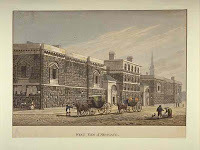
Mr. Caldwell was a thin man of relatively good health, a chronic dry throat and subsequent cough, due to inhalation of copper fumes in the factory, being his only outward sign of ailment. His long gray hair stood testimony to a slight eccentricity and age of eight and fifty years, but his sharp gray eyes projected a clear and deliberate mind. He stated flatly he had lost all desire for the company of others and had not stepped, nor ever intended again to step, one foot past the marble vestibule of his flat. Whatever his reason for doing so was not something he felt the desire to confide in me, nor did I care.
My first week was spent engaged in the purchase of a large steamer trunk, which was to conform to specific dimensions detailed to me by Mr. Caldwell. Why would a man owning two large and well-traveled steamer trunks require a third? At the time the logic was vexing.
My next task seemed quite in line for a man with such a charitable history. I was sent to the Bank Of England to arrange an account for a John Martin Havisham, a young man I understood to be the new recipient of Mr. Caldwell's benevolence. I was given an envelope containing details and the amount to be deposited from Mr. Caldwell's account, an amount that raised more than one eyebrow of the Old Lady of Threadneedle Street.
With the bank transaction completed I was further instructed to set up a weekly account with the grocer just off Carter Lane, handing them each a similar envelope with instructions for administration of the accounts. By weeks end it seemed my domestic tasks were completed, the accounts arranged and the aforementioned steamer trunk having been delivered. We would now begin work on the memoirs.
Mr. Caldwell wanted to complete the memoir in six months, suggesting I move into his guest quarters. I gladly consented. He was very insistent that I not publicize the project and kept me busy twelve hours a day. My only respites were visits to the market when I delivered sealed envelopes given to me by Mr. Caldwell with the weekly order, asking for them to be filled and delivered after nightfall. On one occasion an envelope wasn't sealed. On peering inside I noticed the order was to be charged to the account of J. M. Havisham. It seemed odd to me but, endowed or not, it was still his money.
For the next six months I worked earnestly taking copious notes detailing every event of note from his privileged childhood right through to his incredible travels abroad. By the end of October I had everything I needed to convert sixty years of facts into a compelling memoir.
On the twenty-eighth of October Mr. Caldwell called me in, asking if I would take care of a small matter he had arranged. It was the trunk, the very trunk he had made when I first arrived. He said it was filled with old ledgers and invoices from his business. He had contracted with two surly blokes of questionable repute for the trunk to be picked up, taken down to the docks, and set ablaze until reduced to ashes. I was to accompany the men to ensure the deed was done.
We were on Blackfriars Lane when a gunshot spooked the horses. I was knocked to the ground. The trunk rolled off the back of the cart, crashing onto the cobblestones. The fall had broken open the trunk, exposing a badly decomposed body. I was helped to my feet by two constables, who immediately locked me up.
The subsequent investigation challenged every ounce of sanity I had. It was determined, through questionable police work and assumption, that the body in the trunk was Ebenezer Caldwell. The house on Fleet Street was searched, producing no physical evidence to support my claims of his being alive. What was found was enough evidence to indict me for murder. The Mr. Caldwell I knew had disappeared completely. The two men hired to transport the trunk were never seen again.
***
A key turning in the lock of my cell door interrupted my thoughts. My hand went to the tin cup. To my surprise a man walked in. He was my height, wrapped in a wool coat, scarf and hat. The turnkey stayed behind. With a grunt he closed and locked the door, leaving me alone with my visitor.
The man waited, listening as the footsteps faded off down the passage. He pulled open his scarf, lifted his head and removed the hat.
I pulled myself up from the floor. The shock on my face was evident. My attempt to speak was waved off.
"I can only imagine what you must think of me," he said. He took a labored breath between sentences, followed with a raspy cough. "God forgive me. I was mad with anger. I certainly didn't expect this result."
I was speechless. Here before me was the man I knew to be Ebenezer Caldwell, the man I was accused of killing.
R. Michael Phillips
Author: Along Came A Fifer
www.eastlondonadventurersclub.com
February 23, 2012
Oranges And Lemons - Part 2

My parents were kind and decent people, giving without thought to the less fortunate, and instilling in me the patience to understand my fellow man. My mother was educated, a fortune of her being the daughter of a governess prior to her marriage, and set a formal schedule at home to educate me, as my father was insistent I attain an education and "clean" work with an annual salary.
My father worked a milling machine in a factory located on Cheapside, toward St. Paul's. Mr. Ebenezer Caldwell owned it, having been bequeathed to him on the death of his father. He ran the business with his half-brother Anderson. Mr. Caldwell gave my father the job in gratitude for stopping what was certainly intended as a deadly assault. One evening at dusk, just prior to the glow of the gas lamps, a ruffian confronted Mr. Caldwell and his half-brother on their way home from the factory. When the man produced a revolver Anderson ran, leaving Mr. Caldwell to fend off the attacker alone. My father witnessed the confrontation and came to his aid, thwarting the attack. Anderson's flight was regarded as an act of cowardice that was answered with his dismissal from the company. Mr. Caldwell never saw, nor spoke the name, of his half-brother again.
Those first years of employment for my father were a time of prosperity for my family. I went on to attend Harrow – Mr. Caldwell, I found out years later, facilitated my placement there. I thought the passing of my parents, due to an outbreak of cholera during my second year, would be the end of my formal education. Through Mr. Caldwell's benevolence I continued, eventually attending Cambridge. I remember thinking through my university years how fortunate I was my father interceded on the attack of Mr. Caldwell. That quickly changed, driven with every ounce of malevolence I could dredge up from the bowels of Hades, to wishing my father had left him to die at the hands of his attacker.
You might think it shameful for me to speak of the dead in such a way as this. Shameful to condemn a man whose benevolence afforded my father a decent wage and myself a fine education. Perhaps you're right. At the time I was so consumed with hatred for what he had done to remember the acts of kindness that actually defined his life.
The judge and jury listened patiently as the facts of my case were revealed, occasionally stopping the proceedings to quiet the assorted gawkers jammed into the gallery in the Old Bailey. They were told during the trial Mr. Caldwell was murdered in April of 1886, his body stuffed into a steamer trunk in the attic of his flat on Fleet Street. It was further asserted that I remained in the flat after killing the man, availing myself to his substantial wealth and property. The police and medical examiner gave detailed reports substantiating those claims; claims based largely on information supplied to them from the grocer who delivered our meat and produce, the stationer who sold me the steamer trunk and the banker who set up the account for John Martin Havisham.
My legal counsel, a man whose name I find no need to remember, a man scarcely my senior but mentally and judiciously most certainly my junior, was inept in his ability to dispute even the most subjective of claims by the prosecutor. His laziness placed my whole defense on my testimony, a testimony which brought laughter from the gallery after my insistence of Mr. Caldwell being very much alive up until the twenty-eighth day of October, the last day I spoke with him and six months after his confirmed death. These "delusions", as the court referred to them, were dismissed as nothing more than a feeble attempt to substantiate a claim of mental incapacity in defense of my actions.
I pleaded with the court to hear me out, assuring the judge my defense would be simple and address each of the claims related to the prosecutor's assertion of my guilt.
"If you still find my statements an insult to the integrity of the court," I said, pounding my fist on the well-worn rail before me, "I'll concede my guilt and waste no more of the courts time."
The court was reluctant to indulge me, finally conceding due to the overwhelming insistence from the gallery. It appeared their expectation was of a fanciful tale of my consorting with an apparition; a carefully spun tale to divert the jury from the greed and murder depicted by the prosecutor. The chamber went silent as I began.
I had nothing less than respect and gratitude for Mr. Caldwell. At the time of my graduation from Cambridge he had sold his factory for a substantial sum, resigning himself to a quiet life of travel and leisure. You'll think it odd my having never met the man personally, knowing him only through his benevolence, but such was the case.
With my schooling complete I was excited over the prospect of becoming a journalist and eventually a novelist. The stipend for my education and living expenses, an account set up for me at the Bank of England by Mr. Caldwell, was closed out on my graduation from Cambridge. I took a small flat above a bakery on Bread Street and spent the next three years as an editor with the publishing house of Bascomb & Aldritch, a rather prestigious house with ties to Cambridge. It was there, on that blustery day in March of 1886, when a letter arrived from Mr. Caldwell.
His letter was my first direct contact with him since my parent's death, now twelve years past. It requested I meet with him to discuss writing his memoirs. He wanted people to know the good he had done in this life. This entailed my leaving Bascomb & Aldritch. Without hesitation I agreed, soon finding myself sipping Earl Grey tea in the sitting room of his flat on Fleet Street.
R. Michael Phillips
Author: Along Came A Fifer
www.eastlondonadventurersclub.com



